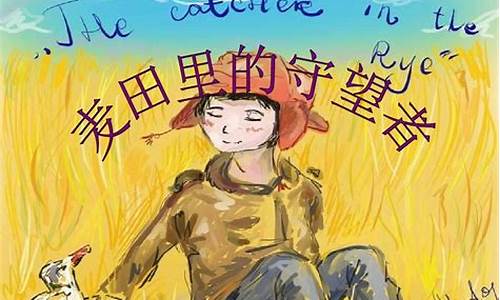麦田里的守望者英文版百度云_麦田里的守望者英文版
1.《麦田里的守望者》故事简介
2.急求《麦田里的守望者》原著里的一段经典句子
3.麦田里的守望者中霍尔顿的英文写法怎么写啊?
4.英美列表

最喜欢这一段
Most of us, however, take life for granted. We know that one day we must die, but usually we picture that day as far in the future. When we are in buoyant health, death is all but unimaginable. We seldom think of it. The days stretch out in an endless vista. So we go about our petty tasks, hardly aware of our listless attitude toward life.
by Hellen Keller
以下是全文
如给我三天光明(海伦·凯勒 Helen Keller)
All of us he read thrilling stories in which the hero had only a limited and specified time to live. Sometimes it was as long as a year; sometimes as short as twenty-four hours. But always we were interested in discovering just how the doomed man chose to spend his last days or his last hours. I speak, of course, of free men who he a choice, not condemned criminals whose sphere of activities is strictly delimited.
Such stories set us thinking, wondering what we should do under similar circumstances. What events, what experiences, what associations should we crowd into those last hours as mortal beings? What hiness should we find in reviewing the past, what regrets?
Sometimes I he thought it would be an excellent rule to live each day as if we should die tomorrow. Such an attitude would emphasize sharply the values of life. We should live each day with a gentleness, a vigor, and a keenness of reciation which are often lost when time stretches before us in the constant panorama of more days and months and years to come. There are those, of course, who would adopt the Epicurean motto of "Eat, drink, and be merry," but most people would be chastened by the certainty of impending death.
In stories the doomed hero is usually sed at the last minute by some stroke of fortune, but almost always his sense of values is changed. he becomes more reciative of the meaning of life and its permanent spiritual values. It ahs often been noted that those who live, or he lived, in the shadow of death bring a mellow sweetness to everything they do.
Most of us, however, take life for granted. We know that one day we must die, but usually we picture that day as far in the future. When we are in buoyant health, death is all but unimaginable. We seldom think of it. The days stretch out in an endless vista. So we go about our petty tasks, hardly aware of our listless attitude toward life.
The same lethargy, I am afraid, characterizes the use of all our faculties and senses. Only the deaf reciate hearing, only the blind realize the manifold blessings that lie in sight. Particularly does this observation ly to those who he lost sight and hearing in adult life. But those who he never suffered impairment of sight or hearing seldom make the fullest use of these blessed faculties. Their eyes and ears take in all sights and sounds hazily, without concentration and with little reciation. It is the same old story of not being grateful for what we he until we lose it, of not being conscious of health until we are ill.
I he often thought it would be a blessing if each human being were stricken blind and deaf for a few days at some time during his early adult life. Darkness would make him more reciative of sight; silence would tech him the joys of sound.
Now and then I he tested my seeing friends to discover what they see. Recently I was visited by a very good friends who had just returned from a long walk in the woods, and I asked her what she had observed.. "Nothing in particular, " she replied. I might he been incredulous had I not been accustomed to such reposes, for long ago I became convinced that the seeing see little.
How was it possible, I asked myself, to walk for an hour through the woods and see nothing worthy of note? I who cannot see find hundreds of things to interest me through mere touch. I feel the delicate symmetry of a leaf. I pass my hands lovingly about the smooth skin of a silver birch, or the rough, shaggy bark of a pine. In the spring I touch the branches of trees hopefully in search of a bud the first sign of awakening Nature after her winter's sleep. I feel the delightful, velvety texture of a flower, and discover its remarkable convolutions; and something of the miracle of Nature is revealed to me. Occasionally, if I am very fortunate, I place my hand gently on a small tree and feel the hy quiver of a bird in full song. I am delighted to he the cool waters of a brook rush thought my open finger. To me a lush carpet of pine needles or spongy grass is more welcome than the most luxurious Persian rug. To me the page ant of seasons is a thrilling and unending drama, the action of which streams through my finger tips.
At times my heart cries out with longing to see all these things. If I can get so much pleasure from mere touch, how much more beauty must be revealed by sight. Yet, those who he eyes arently see little. the panorama of color and action which fills the world is taken for granted. It is human, perhaps, to reciate little that which we he and to long for that which we he not, but it is a great pity that in the world of light the gift of sight is used only as a mere conveniences rather than as a means of adding fullness to life.
If I were the president of a university I should establish a compulsory course in "How to Use Your Eyes". The professor would try to show his pupils how they could add joy to their lives by really seeing what passes unnoticed before them. He would try to awake their dormant and sluggish faculties.
Perhaps I can best illustrate by imagining what I should most like to see if I were given the use of my eyes, say, for just three days. And while I am imagining, suppose you, too, set your mind to work on the problem of how you would use your own eyes if you had only three more days to see. If with the on-coming darkness of the third night you knew that the sun would never rise for you again, how would you spend those three precious intervening days? What would you most want to let your gaze rest upon?
I, naturally, should want most to see the things which he become dear to me through my years of darkness. You, too, would want to let your eyes rest on the things that he become dear to you so that you could take the memory of them with you into the night that loomed before you.
If, by some miracle, I were granted three seeing days, to be followed by a relapse into darkness, I should divide the period into three parts.
The First Day
On the first day, I should want to see the people whose kindness and gentleness and companionship he made my life worth living. First I should like to gaze long upon the face of my dear teacher, Mrs. Anne Sullivan Macy, who came to me when I was a child and opened the outer world to me. I should want not merely to see the outline of her face, so that I could cherish it in my memory, but to study that face and find in it the living evidence of the sympathetic tenderness and patience with which she accomplished the difficult task of my education. I should like to see in her eyes that strength of character which has enabled her to stand firm in the face of difficulties, and that compassion for all humanity which she has revealed to me so often.
I do not know what it is to see into the heart of a friend through that "Window of the soul", the eye. I can only "see" through my finger tips the outline of a face. I can detect laughter, sorrow, and many other obvious emotions. I know my friends from the feel of their faces. But I cannot really picture their personalities by touch. I know their personalities, of course, through other means, through the thoughts they express to me, through whatever of their actions are revealed to me. But I am denied that deeper understanding of them which I am sure would come through sight of them, through watching their reactions to various expressed thoughts and circumstances, through noting the immediate and fleeting reactions of their eyes and countenance.
Friends who are near to me I know well, because through the months and years they reveal themselves to me in all their phases; but of casual friends I he only an incomplete impression, an impression gained from a handclasp, from spoken words which I take from their lips with my finger tips, or which they tap into the palm of my hand.
How much easier, how much more satisfying it is for you who can see to grasp quickly the essential qualities of another person by watching the suleties of expression, the quiver of a muscle, the flutter of a hand. But does it ever occur to you to use your sight to see into the inner nature of a friends or acquaintance/ Do not most of you seeing people grasp casually the outward features of a face and let it go at that?
For instance can you describe accurately the faces of five good friends? some of you can, but many cannot. As an experiment, I he questioned husbands of long standing about the color of their wives' eyes, and often they express embarrassed confusion and admit that they do not know. And, incidentally, it is a chronic complaint of wives that their husbands do not notice new dresses, new hats, and changes in household arrangements.
The eyes of seeing persons soon become accustomed to the routine of their surroundings, and they actually see only the startling and spectacular. But even in viewing the most spectacular sights the eyes are lazy. Court records reveal every day how inaccurately "eyewitnesses" see. A given event will be "seen" in several different ways by as many witnesses. Some see more than others, but few see everything that is within the range of their vision.
Oh, the things that I should see if I had the power of sight for just three days!
The first day would be a busy one. I should call to me all my dear friends and look long into their faces, imprinting upon my mind the outward evidences of the beauty that is within them. I should let my eyes rest, too, on the face of a baby, so that I could catch a vision of the eager, innocent beauty which precedes the individual's consciousness of the conflicts which life develops.
And I should like to look into the loyal, trusting eyes of my dogs - the gre, canny little Scottie, Darkie, and the stalwart, understanding Great Dane, Helga, whose warm, tender , and playful friendships are so comforting to me.
On that busy first day I should also view the small simple things of my home. I want to see the warm colors in the rugs under my feet, the pictures on the walls, the intimate trifles that transform a house into home. My eyes would rest respectfully on the books in raised type which I he read, but they would be more eagerly interested in the printed books which seeing people can read, for during the long night of my life the books I he read and those which he been read to me he built themselves into a great shining lighthouse, revealing to me the deepest channels of human life and the human spirit.
In the afternoon of that first seeing day. I should take a long walk in the woods and intoxicate my eyes on the beauties of the world of Nature trying desperately to absorb in a few hours the vast splendor which is constantly unfolding itself to those who can see. On the way home from my woodland jaunt my path would lie near a farm so that I might see the patient horses ploughing in the field 9perhaps I should see only a tractor!) and the serene content of men living close to the soil. And I should pray for the glory of a colorful sunset.
When dusk had fallen, I should experience the double delight of being able to see by artificial light which the genius of man has created to extend the power of his sight when Nature decrees darkness.
In the night of that first day of sight, I should not be able to sleep, so full would be my mind of the memories of the day.
The Second Day
The next day - the second day of sight - I should arise with the dawn and see the thrilling miracle by which night is transformed into day. I should behold with awe the magnificent panorama of light with which the sun awakens the sleeping earth.
This day I should devote to a hasty glimpse of the world, past and present. I should want to see the pageant of man's progress, the kaleidoscope of the ages. How can so much be compressed into one day? Through the museums, of course. Often I he visited the New York Museum of Natural History to touch with my hands many of the objects there exhibited, but I he longed to see with my eyes the condensed history of the earth and its inhabitants displayed there - animals and the races of men pictured in their native environment; gigantic carcasses of dinosaurs and mastodons which roamed the earth long before man eared, with his tiny stature and powerful brain, to conquer the animal kingdom; realistic presentations of the processes of development in animals, in man, and in the implements which man has used to fashion for himself a secure home on this planet; and a thousand and one other aspects of natural history.
I wonder how many readers of this article he viewed this panorama of the face of living things as pictured in that inspiring museum. Many, of course, he not had the opportunity, but I am sure that many who he had the opportunity he not made use of it. there, indeed, is a place to use your eyes. You who see can spend many fruitful days there, but I with my imaginary three days of sight, could only take a hasty glimpse, and pass on.
My next stop would be the Metropolitan Museum of Art, for just as the Museum of Natural History reveals the material aspects of the world, so does the Metropolitan show the myriad facets of the human spirit. Throughout the history of humanity the urge to artistic expression has been almost as powerful as the urge for food, shelter, and procreation. And here , in the vast chambers of the Metropolitan Museum, is unfolded before me the spirit of Egypt, Greece, and Rome, as expressed in their art. I know well through my hands the sculptured gods and goddesses of the ancient Nile-land. I he felt copies of Parthenon friezes, and I he sensed the rhythmic beauty of charging Athenian warriors. Apollos and Venuses and the Winged Victory of Samothrace are friends of my finger tips. The gnarled, bearded features of Homer are dear to me, for he, too, knew blindness.
My hands he lingered upon the living marble of roman sculpture as well as that of later generations. I he passed my hands over a plaster cast of Michelangelo's inspiring and heroic Moses; I he sensed the power of Rodin; I he been awed by the devoted spirit of Gothic wood carving. These arts which can be touched he meaning for me, but even they were meant to be seen rather than felt, and I can only guess at the beauty which remains hidden from me. I can admire the simple lines of a Greek vase, but its figured decorations are lost to me.
So on this, my second day of sight, I should try to probe into the soul of man through this art. The things I knew through touch I should now see. More splendid still, the whole magnificent world of painting would be opened to me, from the Italian Primitives, with their serene religious devotion, to the Moderns, with their feverish visions. I should look deep into the canvases of Raphael, Leonardo da Vinci, Titian, Rembrandt. I should want to feast my eyes upon the warm colors of Veronese, study the mysteries of E1 Greco, catch a new vision of Nature from Corot. Oh, there is so much rich meaning and beauty in the art of the ages for you who he eyes to see!
Upon my short visit to this temple of art I should not be able to review a fraction of that great world of art which is open to you. I should be able to get only a superficial impression. Artists tell me that for deep and true reciation of art one must educated the eye. One must learn through experience to weigh the merits of line, of composition, of form and color. If I had eyes, how hily would I embark upon so fascinating a study! Yet I am told that, to many of you who he eyes to see, the world of art is a dark night, unexplored and unilluminated.
It would be with extreme reluctance that I should lee the Metropolitan Museum, which contains the key to beauty -- a beauty so neglected. Seeing persons, however, do not need a metropolitan to find this key to beauty. The same key lies waiting in smaller museums, and in books on the shelves of even small libraries. But naturally, in my limited time of imaginary sight, I should choose the place where the key unlocks the greatest treasures in the shortest time.
The evening of my second day of sight I should spend at a theatre or at the movies. Even now I often attend theatrical performances of all sorts, but the action of the play must be spelled into my hand by a companion. But how I should like to see with my own eyes the fascinating figure of Hamlet, or the gusty Falstaff amid colorful Elizabethan trings! How I should like to follow each movement of the graceful Hamlet, each strut of the hearty Falstaff! And since I could see only one play, I should be confronted by a many-horned dilemma, for there are scores of plays I should want to see. You who he eyes can see any you like. How many of you, I wonder, when you gaze at a play, a movie, or any spectacle, realize and give thanks for the miracle of sight which enables you to enjoy its color , grace, and movement?
I cannot enjoy the beauty of rhythmic movement except in a sphere restricted to the touch of my hands. I can vision only dimly the grace of a Plowa, although I know something of the delight of rhythm, for often I can sense the beat of music as it vibrates through the floor. I can well imagine that cadenced motion must be one of the most pleasing sights in the world. I he been able to gather something of this by tracing with my fingers the lines in sculptured marble; if this static grace can be so lovely, how much more acute must be the thrill of seeing grace in motion.
One of my dearest memories is of the time when Joseph Jefferson allowed me to touch his face and hands as he went through some of the gestures and speeches of his beloved Rip Van Winkle. I was able to catch thus a meager glimpse of the world of drama, and I shall never forget the delight of that moment. But, oh, how much I must miss, and how much pleasure you seeing ones can derive from watching and hearing the interplay of speech and movement in the unfolding of a dramatic performance! If I could see only one play, I should know how to picture in my mind the action of a hundred plays which I he read or had transferred to me through the medium of the manual alphabet.
《麦田里的守望者》故事简介
易经 有精力好好研究一下 。 《钢铁是怎样炼成的》, <鲁滨逊漂流记> ,还有《麦田里的守望者》什么的。
《福尔摩斯》我超喜欢,故事很有趣,而且帮助培养逻辑思维,帮助理解事物。
我还喜欢一些心理学的书,了解自己,了解别人才能提高。推荐《心理学与生活》,入门读物,也是最全的,相等于导论。是外国人编写的教材(有中文版),很多例子,不会闷。也可以看一下《改变心理学的40项研究》中文版出到第五版,英文版有第六版。这本囊括了心理学的经典研究,并且比较有趣。
《西游记》也算立志了。 学学唐僧坚定不移的信念。 有信念的人真的很强大。
《三国》英雄成败,胜不骄,败不馁。 成大事必须拿得起放得下。
中国的四大名著我感觉都很好。
还有你可以看些**,**也会有很多能让人受到启发的东西。
而我自己, 我对动漫非常痴迷,也因为一部本命动漫改变了自己。 不一定要最好的,找到最适合自己的东西才是好的。
急求《麦田里的守望者》原著里的一段经典句子
该书的主人公霍尔顿是个中学生,出生于富裕的中产阶级家庭。他虽只有16岁,但比常人高一头,整日穿着风衣,戴着猎帽,游游荡荡,不愿读书。他对学校里的一切——老师、同学、功课、球赛等等,全都腻烦透了,曾是学校击剑队队长,3次被学校开除。它不仅生动细致地描绘了一个不安现状的中产阶级子弟的苦闷仿徨、孤独愤世的精神世界,一个青春期少年矛盾百出的心理特征,也批判了成人社会的虚伪和做作。
《麦田里的守望者》是美国作家杰罗姆·大卫·塞林格创作的唯一一部长篇,首次出版于1951年。塞林格将故事的起止局限于16岁的中学生霍尔顿·考尔菲德从离开学校到纽约游荡的三天时间内,并借鉴了意识流天马行空的写作方法,充分探索了一个十几岁少年的内心世界。
扩展资料
表现的社会是一个异化的社会,也是一个道德堕落的社会。在这种社会范围内的整体性的堕落中,个体的堕落有可能在表层的堕落之下蕴含着深层的反堕落和道德的信息,有可能具有积极的内涵。霍尔顿以其自身的堕落揭示和反抗着异化社会中道德的堕落。在其堕落中可以窥见某种道德性,他所展示的是堕落行为里的道德,一种堕落的道德。
关于的主人公兼叙述者霍尔顿的语言,评论家们众说纷纭、褒贬不一,有些意见还是针锋相对、截然相反的。
一面世就引来众怒,一些评论家认为其语言“”、“渎神”。但也不乏有人高度赞赏霍尔顿的语言,国外某些评论家把霍尔顿的语言与马克·吐温笔下人物哈克的语言相提并论,加以赞美。他们认为这两个流浪少年的方言口语,会在文学天地里流芳百世、永放光彩。?
参考资料:
麦田里的守望者中霍尔顿的英文写法怎么写啊?
all these little kids playing some game in this big field of rye and all. Thousands of little kids, and nobody's around--nobody big, I mean--except me. And I'm standing on the edge of some crazy cliff. What I he to do, I he to catch everybody if they start to go over
the cliff--I mean if they're running and they don't look where they're going I he to come out from somewhere and catch them. That's all I'd do all day. I'd just be the catcher in the
rye and all.
英美列表
JD Salinger的名篇《麦田守望者》(The Catcher In The Rye)
文章的主人公是一个中学生,名字叫霍藤(Holden),在一个名叫Pencey的中学上学。
英语名著大全
《Ahauntedhouse》——英国著名意识流女作家伍尔夫的作品。
《Billybudd》——hermanmelville的作品。
《Goodwives》——十九世纪美国出色的女作家alcott的作品。
《Kim》——诺贝尔奖金获得者、英国作家吉卜林的作品。
《Moonfleet》——j.meade-falkner的作品。
《Northangerabbey》——十九世纪英国著名女作家奥斯汀的作品。
《Persuasion》——十九世纪英国著名女作家奥斯汀的。
《Princeotto》——英国作家史蒂文森的作品。
《Rocking-horsewinner》——英国作家劳伦斯的作品。
《Stalkyandcompany》——诺贝尔奖金获得者、英国作家吉卜林的作品。
《Theassignation》——美国神秘家爱伦坡的作品。
《Thecaskofamontillado》——美国神秘家爱伦坡的作品。
《Thechimes》——英国作家狄更斯的作品。
《Thecricketonthehearth》——英国作家狄更斯的作品。
《Thedynamiter》——英国作家史蒂文森的作品。
《Themillonthefloss》——英国作家乔治.艾略特的作品。
《Thephantomoftheopera》——gastonleroux的作品。
《Thepitandthependulum》——美国神秘家爱伦坡的作品。
《Theransomofredchief》——美国作家欧亨利的。
《Thetell-taleheart》——美国神秘家爱伦坡的作品。
《Thetenantofwildfellhall》——安.勃朗特的。她是勃朗特三姐妹中最小的一位。
《Whatkatydidnext》——Susancoolidge的作品。
《艾玛》——十九世纪英国著名女作家奥斯汀的作品。
《暗藏杀机》——阿加莎.克里斯蒂著。
《安娜卡列尼娜》——“幸福的家庭都是相似的,不幸的家庭各有各的不幸。”俄国伟大的文学家托尔斯泰的名著。
《傲慢与偏见》——十九世纪著名英国女作家奥斯汀的代表作。
《奥赛罗》——英国戏剧大师莎士比亚的四大悲剧之一。描写武将奥赛罗中了部下伊阿古的奸计,因嫉妒发狂而杀死妻子,自己也自杀身亡。
《巴斯克威尔的猎犬》——英国大师柯南道尔的福尔摩斯探案集中著名的一篇。
《白衣女人》——英国家柯林斯的作品。
《变形记》——卡夫卡的名作。
《波洛圣诞探案记》——阿加莎.克里斯蒂著。
《查泰莱夫人的情人》——英国作家劳伦斯的代表作,曾引起争议并被英国视为。
《丛林丛书》——英国作家吉卜林的名著。
《道林.格雷的肖像》——这是英国作家王尔德唯一的长篇。
《第三十九级台阶》——著名一战间谍片。
《都柏林人》——英国意识流大师乔伊斯的名著。
《儿子和情人》——以心理分析见长的英国作家劳伦斯的著名。
《福尔摩斯探案之海军协定》——英国作家柯南道尔著。
《浮士德》——德国作家歌德的名作。
《哈克贝利芬恩历险记》——美国著名作家马克吐温的名著。
《哈姆雷特》——英国戏剧大师莎士比亚的四大经典悲剧之一。这部描述丹麦王子复仇的作品使伊莉莎白王朝的戏剧达到了最高峰。
《海底两万里》——法国科学幻想大师儒勒凡尔纳的名著。
《黑郁金香》——法国作家大仲马的名著,曾被拍成**。
《呼啸山庄》——英国女作家艾密莉勃朗特的名著。
《呼啸山庄》——英国女作家艾米莉.勃朗特的代表作。描述了一个因贫富悬殊造成的爱情悲剧。
《化身博士》——英国家史蒂文森的名著。
《环绕地球八十天》——法国科学幻想大师儒勒.凡尔纳的著名。
《基督山伯爵》——法国作家大仲马的名著。
《吉姆爷》——josephconrad的名著。
《金银岛》——英国家史蒂文森的名著。
《卡斯特桥》——英国作家哈代的名著。
《坎特伯雷故事》——英国作家乔叟的名著。
《李尔王》——英国戏剧大师莎士比亚的四大悲剧之一。描写的是不列颠老王李尔的悲剧。
《恋爱中的女人》——英国作家劳伦斯的作品。
《鲁宾逊飘流记》——英国作家笛福的名作。
《罗蜜欧与朱丽叶》——英国戏剧大师莎士比亚的经典悲剧之一。曾被多次拍成**。
《麦克白》——英国戏剧大师莎士比亚的四大悲剧之一。描写苏格兰勇将麦克白的悲剧。
《麦琪的礼物》——美国著名短篇家欧亨利的著名作品。
《梦的解析》——弗洛伊德的名著。
《命案目睹记》——阿加莎.克里斯蒂著。
《匹克威克外传》——英国现实主义作家狄更斯的作品。
《人性的枷锁》——英国著名家毛姆具有自传性的。
《三剑客》——法国作家大仲马的名著。
《圣诞颂歌》——英国作家狄更斯的作品。
《书剑恩仇录》——金庸英文版。
《双城记》——英国作家狄更斯的名著。
《双城记》——英国现实主义大家狄更斯的名著。
《斯泰尔斯的神秘案件》——阿加莎.克里斯蒂著。
《她》——h.rider.haggard的作品。
《苔斯》——英国作家哈代的名著。改编自的**曾轰动一时。
《汤姆索耶历险记》——美国著名作家马克吐温的名著。
《汤姆索耶历险记》——美国幽默大师马克吐温的代表作。
《铁面人》——法国作家大仲马的著名,曾被拍成**。
《王尔德的短篇和诗歌》——收录英国作家奥斯卡.王尔德的短篇14篇、诗歌6首。
《王子与贫儿》——美国作家马克.吐温的名作。
《无名的裘德》——英国作家托马斯.哈代的名作。
《小妇人》——louisamayalcott的代表作。她生于1832年,是十九世纪最伟大的女性家之一。
《野性的呼唤》——美国作家杰克伦敦的名作。
《一个青年艺术家的肖像》——英国意识流大师乔伊斯的著名。
《尤里西斯》——英国意识流大师乔伊斯的代表作,曾被称为“天书”。
《远大历程》——英国著名现实主义作家狄更斯的名作。
《远大前程》(update)——英国作家狄更斯的名著。
《月亮石》——英国家柯林斯的作品。
《最后一个莫希干人》——讲述北美洲印第安土族居民的神奇故事。曾被拍成**。
英语名著大全
1 哈克贝利·弗恩历险记——马克·吐温
The Adventures of Huckleberry Finn by Mark Twain
哈克贝利是一个聪明、善良、勇敢的白人少年。他为了追求自由的生活,逃亡到密西西比河上。在逃亡途中,他遇到了黑奴吉姆。吉姆是一个勤劳朴实、热情诚实、忠心耿耿的黑奴,他为了逃脱被主人再次卖掉的命运,从主人家中出逃。他们一起漂流在密西西比河上,过着自由自在的生活,两人成了好朋友。哈克贝利为了吉姆的自由,历尽千辛万苦,最后得知,吉姆的主人已在遗嘱里解放了他。中,哈克贝利和吉姆的性格鲜明突出,形象栩栩如生。全篇的现实主义描绘和浪漫主义抒情交相辉映,尖锐深刻的揭露、幽默辛辣的讽刺以及浪漫的描写浑然一体,形成了马克·吐温独特的艺术风格。
2 纯真年代——华顿
The Age of Innocence by Edith Wharton
伊迪丝·沃顿1921年获得普立策文学奖的,她也是普立策奖历史上首度获奖的女性作家。
的主要情节发生在19世纪70年代末80年代初的纽约上流社会。那是伊迪丝度过童年与青春的地方,她在那儿长大成人,进入社交界,订婚又解除婚约,最后嫁给波士顿的爱德华华顿,并度过了婚后的最初几年。时隔40年后,作为家的她回顾养育过她也束缚过她的那个社会,她的感情是复杂的,既有亲切的眷恋,又有清醒的针砭。作家把那个时代的纽约上流社会比作一个小小的金字塔,它又尖又滑,很难在上面取得立足之地。处在塔顶,真正有贵族血统的只有二三户人家:华盛顿广场的达戈内特祖上是正宗的郡中世家;范德卢顿先生是第一任荷兰总督的嫡孙,他家曾与法国和英国的几家贵族联姻;还有与德格拉斯伯爵联姻的拉宁一家。他们是上流社会的最高阶层,但显然已处于日薄西山的衰败阶段。上流社会的中坚力量是以明戈特家族、纽兰家族、奇弗斯家族为代表的名门望族,他们的祖辈都是来自英国或荷兰的富商,早年在殖民地发迹,成为有身份有地位的人物。比如纽兰·阿切尔的一位曾外祖父曾参与过独立宣言的签署,还有一位曾在华盛顿部下任将军。正如阿切尔太太所说的,“纽约从来就是个商业社会”,占支配地位的是这些殷实的富商。处于金字塔底部的是富有却不显贵的人们,他们多数是内战之后崛起的新富,凭借雄厚的财力,通过联姻而跻身上流社会。作者从亲身经历与熟悉的环境中提炼素材,塑造人物,将作品题材根置于深厚的现实土壤中。尤其通过博福特命运浮沉这一线索与主人公爱情悲剧的主线相互映衬,使一个看似寻常的爱情故事具备了深刻的社会现实意义。
3 白鲸——梅尔维尔
Moby-Dick by Herman Melville
《白鲸》是美国十九世纪浪漫主义家梅尔维尔的代表作。在美国文学史和世界文学史上,《白鲸》都是一部经典的著作,一部伟大的,是研究美国文学的一部必读书。《白鲸》展示给我们的是船长亚哈为追杀白鲸带领佩阔德号及其般员为复仇而走向毁灭的过程。书中以象征主义及寓言体的写作方式向我们展示了一部十九世纪美国的真实画面。从人与自然的抗争中亚哈的悲剧,人与人的关系中所体现的悲剧两个角度可以揭示《白鲸》所表现的时代特征及所蕴涵的悲剧实质。
4 红字——纳撒尼尔·霍桑
The Scarlet Letter by Nathaniel Hawthorne
19世纪美国浪漫主义作家霍桑的长篇。创作于1851年。以两百多年前的殖民地时代的美洲为题材,但揭露的却是19世纪资本主义发展时代美利坚合众国社会典法的残酷、宗教的欺骗和道德的虚伪。主人丝特被写成了崇高道德的化身。她不但感化了表里不一的丁梅斯代尔,同时也在感化着充满罪恶的社会。至于她的丈夫奇林渥斯,则把他写成了一个一心只想窥秘复仇的影子式的人物。他在中只起情节铺垫的作用。
惯用象征手法,人物、情节和语言都颇具主观想象色彩,在描写中又常把人的心理活动和直觉放在首位。因此,它不仅是浪漫主义的代表作,同时也被称作是美国心理分析的开创篇。
5 最后的莫希干人——库柏
The Last of the Mohicans by James Fenimore Cooper
《最后的莫希干人》是《皮裹腿故事集》中最出色的一部。故事发生在十八世纪五十年代末期,英法两国为争夺北美殖民地而进行的“七年战争”的第三年,地点是在赫德森河的源头和乔治湖一带。对于印第安人的被杀戮和印第安部落的消亡,作者的心情是十分沉重的,他深深怀着同情和愤慨。他写道:“莫希干人的领土,是被欧洲人侵占去的美洲大陆的第一块地盘,因而,莫希干人就第一个成了离乡背井的人。面临着文明的推进,也可以说,文明的入侵,所有印第安部落的人民,就像他们故土林木上的绿叶在刺骨的严寒侵凌下纷纷坠地一样,日益消亡,看来这已成为落到他们头上的不可避免的命运。有足够的历史事实可以证明,这幅惨像并非虚妄之作。”
作者把本书取名为《最后的莫希干人》,就有着令人心酸的悲哀音调。正直、勇敢的莫希干人恩卡斯和美丽善良的科拉之死,也不无更深的寓意:随着他们的死去,他们心灵上的那种美德和纯洁的感情也消亡了,留下的只是笼罩在美洲大地上的那些贪婪、残暴的恶意和邪念。
6 小妇人——路易莎·奥尔科特
Little Women by Louisa May Alcott
这部以家庭生活为描写对象,以家庭成员的感情纠葛为线索,描写了马奇一家的天伦之爱。马奇家的四姐妹中,无论是为了爱情甘于贫困的梅格,还是通过自己奋斗成为作家的乔,以及坦然面对死亡的贝思和以扶弱为己任的艾米,虽然她们的理想和命运都不尽相同,但是她们都具有自强自立的共同特点。描写了她们对家庭的眷恋;对爱的忠诚以及对亲情的渴望。马奇一家有四个姐妹,生活清贫、简单而又温馨。四组妹性格迥异;老大梅格漂亮端庄,有些爱慕虚荣;老二乔自由独立,渴望成为作家,老三贝丝善良羞涩,热爱音乐,老四埃米聪慧活泼,爱好艺术,希望成为一名上流社会的“淑女”。
所有时代的所有少女成长过程中所要面对的经历的,都可以在这本书中找到:初恋的甜蜜和烦恼,感情与理智的译,理想和现实的差距,贫穷与富有的矛盾。
7 野性的呼唤——杰克·伦敦
The Call of the Wild by Jack London
《野性的呼唤》是杰克·伦敦最负盛名的。故事主要叙述一只强壮勇猛的狼狗巴克从人类文明社会回到狼群原始生活的过程。巴克是一头体重140磅的十分强壮的狗。他本来在一个大法官家里过着优裕的生活,后来被法官的园丁偷走,辗转卖给邮局,又被送到阿拉斯加严寒地区去拉运送邮件的雪橇。巴克最初被卖给两个法裔加拿大人。这些被买来的狗不仅受到了冷酷的人类的虐待,而且在狗之间为了争夺狗群的领导权,也无时不在互相争斗、残杀。由于体力超群、机智勇敢,巴克最终打败斯比茨成为狗群的领队狗。他先后换过几个主人,最后被约翰·索顿收留。那是在巴克被残暴的主人哈尔打得遍体鳞伤、奄奄一息时,索顿救了他,并悉心为他疗伤。在索顿的精心护理下巴克恢复得很快,由此他们之间产生了真挚的感情。巴克对索顿非常忠诚,他两次不顾生命危险救了索顿的命,并在索顿和别人打赌时,拼命把一个载有一千磅盐的雪橇拉动,为索顿赢了一大笔钱。不幸的是,在淘金的过程中,索顿被印第安人杀死。狂怒之下,巴克咬死了几个印第安人,为主人报了仇。这时恩主已死,他觉得对这个人类社会已无所留恋。况且,一段时期以来,荒野中总回荡着一个神秘的呼唤声。这个声音吸引着他。最终,他回应着这个声音,进入森林,从此与狼为伍,过着原始动物的生活。但他不忘旧谊,仍然定期到主人的葬身之处去凭吊。
8 汤姆叔叔的小屋——哈里特·比彻·斯托
Uncle Tom's Cabin by Harriet Beecher Stowe
出生于康涅狄格州的斯托夫人,是哈特福德女子学院(Hartford Female Academy)的一名教师,同时,她也是一位积极的废奴主义者。全书围绕着一位久经苦难的黑奴汤姆叔叔的故事展开,并描述了他与他身边人——均为奴隶与奴隶主——的经历。这部感伤深刻地描绘出了奴隶制度残酷的本质;并认为基督徒的爱可以战胜由奴役人类同胞所带来的种种伤害。
《汤姆叔叔的小屋》这部是19世纪最畅销的(以及第二畅销的书,仅次于最畅销的书《圣经》)并被认为是刺激1850代废奴主义兴起的一大原因。在它发表的头一年里,在美国本土便销售出了三十万册。《汤姆叔叔的小屋》对美国社会的影响是如此巨大,以致在南北战争爆发的初期,当林肯接见斯托夫人时,曾说到:“你就是那位引发了一场大战的小妇人。”后来,这句话为众多作家竞相引用。
《汤姆叔叔的小屋》以及受其启发而写作出的各种剧本,还促进了大量黑人刻板印象的产生,不少的这些形象在当今都为人们所熟知。譬如慈爱善良的黑人保姆、黑小孩的原型、以及顺从、坚忍并忠心于白人主人的汤姆叔叔。最近几十年来,《汤姆叔叔的小屋》中的这些消极成分,已在一定程度上弱化了这本书作为“重要的反奴隶制工具”的历史作用。
9 鸽之翼——亨利·詹姆斯
The Wings of the Dove by Henry James
这本书的知名度不及作者另外两部长篇《一个美国人》、《贵妇的肖像》,不过亨利詹姆斯在这本中所塑造的米莉角色其实是在纪念他早逝的美国表妹, 并用以对比欧洲巧诈虚伪的世故人情。詹姆斯是同性恋者。他与同时代的美国女作家伊迪丝·华顿(纯真年代作者)保持着长期的友谊。描写一位英国记者为钱财追求一个患有不治之症的美国姑娘的故事。一个三角恋的故事演绎了道德和爱情的挣扎。
10 怪异故事集——埃德加·爱伦·坡
Tales of the Grotesque and Arabesque by Edgar Allan Poe
这是美国作家爱伦·坡的一部短篇集。原始的版本于1840年在费城出版,分上下两卷,共25篇。(待续)
非类文学作品 Nonfiction
11 瓦尔登湖——亨利·梭罗
Walden by Henry Did Thoreau
瓦尔登湖(Walden; or, Life in the Woods),中国大陆译“瓦尔登湖”,台湾译“湖滨散记”,是美国作家亨利·戴维·梭罗所著的一本著名散文集。
该书出版于1854年,梭罗在书中详尽地描述了他在瓦尔登湖湖畔一片再生林中度过两年又两月的生活以及期间他的许多思考。瓦尔登湖地处美国马萨诸塞州东部的康科德城,离梭罗家不远。梭罗把这次经历称为简朴隐居生活的一次尝试。
《瓦尔登湖》的中文译本有多种,例如有徐迟、张知遥以及戴欢等翻译的版本。
美国的19世纪是个辉煌的时代,一大批作家都深受超验主义的影响,主活在这一时代的梭罗也不例外。作为这个时代的代表人物,梭罗对超验主义更是身体力行,《瓦尔登湖》就是他这一思想的体现,它是一部蕴含了深刻哲理的散文。细细读过《瓦尔登湖》的人都有体会;他是在探求怎样实实在在的生活,怎样体验与经历有意义的生活,为自己,也为他的市民同胞,还有当时与后来的读者们。
本书以春天开始,历经了夏天、秋天和冬天,又以春天结束,这正是一个生命的轮回,终点又是起点,生命开始复苏。
12 超越奴役——布克·华盛顿
Up From Slery by Booker T. Washington
布克尔·华盛顿(一八五六——一九一五)是美国十九世纪下半叶产生的最有影响的黑人领袖。他主张种族和睦,号召黑人通过教育自助自救,提高自身素质,掌握专门技艺,加强经济实力,从而改善整个黑人种族的境遇和地位,本书是是布克尔·华盛顿的自传.
13 亨利·亚当斯的教育——亨利·亚当斯
The Education of Henry Adams by Henry Adams
本书曾于1919年获普利策奖,自问世以来,一版再版,并被译成多国文字,广为流传,经久不衰。亨利·亚当斯为美国著名历史学家,先后就读、执教于哈佛大学,曾任美国历史学会。他出身于声名显赫的总统世家。他以第三人称写成的自传体作品《亨利·亚当斯的教育》,是享誉世界的经典传记,也是世界一流的教育经典与历史文化名著。本书运用自传与德式教育相结合,对一个时代进行了批判性的评价。它要说的不是本书所讲述的历史,而是对那一段历史的反思,因此,亚当斯希望人们这样来看他这本书,把这本书当做一个历史哲学的思辨过程。
诗歌
14 草叶集——沃尔特·惠特曼
Lees of Grass by Walt Whitman
《草叶集》是十九世纪美国作家惠特曼的浪漫主义诗集,共收有诗歌三百余首,诗集得名于其中这样的一句诗:“哪里有土,哪里有水,哪里就长着草。”
草叶是最普通、最有生命力的东西,象征着当时正在蓬勃发展的美国。诗集通过“自我”感受和“自我”形象,热情歌颂了资本主义上升时期的美国。
惠特曼从小热爱民主和自由,他只读过五六年书,十几岁就外出谋生。他当过排字工人、木工、泥水匠、农村教师和编辑等。惠特曼勤奋好学,利用业余时间阅读了大量世界文学名著。他从十九世纪四十年代起开始写诗,于1855年出版了《草叶集》的第一版。他在一封给朋友的信中说:“记着,这本书是我从1838年至1853年间在布鲁克林的生活中涌现出来的,其中吸进了千百万个人和十五年的生活;那种亲密,那种热烈,那种陶醉,简直是无与伦比的。”
《草叶集》是惠特曼一生创作的总汇,也是美国诗歌史上一座灿烂的里程碑。作品包含了丰富而深刻的思想内容,充分反映了十九世纪中期美国的时代精神。诗人站在激进的资产阶级民主主义立场上讴歌美国这块“民主的大地”:
那里没有奴隶,也没有奴隶的主人,
那里人民立刻起来反对被选人的无休止的胡作非为,
那里男人女人勇猛地奔赴死的号召,有如大海汹涌的狂浪,
那里外部的权利总是跟随在内部的权利之后,
那里公民总是头脑和理想,总统,,州长只是有报酬的雇用人,
那里孩子们被教育着自己管理自己,并自己依靠自己,
15 诗——艾米莉·狄金森
Poems by Emily Dickinson
艾米莉·狄金森在一八八六年与世长辞;而她深锁在盒子里的大量创作诗篇,则是她留给世人的最大厚礼。纵然在她有生之年,她的作品未能获得当时的青睐,然而周遭众人对她的不解与误会,却丝毫无法低损她丰富的创作天分。根据现存作品,艾米莉惊人的创作力为自己,也为世人留下一千八百首诗,包括了定本的一千七百七十五首与新近发现的二十五首。
艾米莉的妹妹——拉维妮雅(Linia)认得艾米莉的字迹,但她却不了解这些文字代表的是艾米莉终其一生的热情。当她发现这个藏着一千多首诗的箱子时,她真的十分震惊。无论拉维妮雅是否了解这些诗句的真正价值,或者只是因为它们是“艾米莉所写的诗”,她都坚信这些诗作一定得出版。通过她的大力奔走,再加上玛波·鲁米斯·陶德(Mabel Loomis Todd)编辑的鼎力相助,第一辑的艾米莉诗本终于在一八九零年付梓出版,书里所收录的诗作只是艾米莉毕生创作中的一小部分。第一辑总共印了十一刷,而第二辑及第三辑也分别在一八九一年及一八九六年顺利付梓问世。一般大众及多数的评论家都给这些诗作相当高的评价。到了一八九六年,艾米莉·狄金森已成为家喻户晓的知名诗人。之后更多的作品,包括许多由其它管道收集的诗作,在接下来的五十年大量地出现,但直到一九九五年全三册的定本才由汤玛斯·约翰森(Thomas H.Johnson)审定出版。这本书一共收集了一千七百七十五首诗以及一些断简残编,并依照时间顺序编辑排足,由哈佛大学出版社的贝尔耐出版部(Belknap Press of Harvard University Press)出版。
艾米莉死后,世人才重新定位她的诗人身份,同时也认清了自己错过些什么。然而,艾米莉的个人真实生活风貌,却始终难以真正获得厘清。虽然市面上有不少关于她的传记、评论及心理分析的著作出现,但她的日常生活却鲜为人知,而且艾米莉与周遭亲友间的相处关系,却一直没有什么资料留存,于是大多数人仅能揣测这些关系的真正面貌。最近这几年,许多出土的资料已经让黑暗的角落有了一线曙光,但是所谓“真正的艾米莉”,学界仍然存在着许多不同的诠释。
16 海华沙之歌——朗费罗
The Song of Hiawatha by Henry Wadsworth Longfellow
费朗罗(1807-1882),美国诗人。1807年2月22日生于缅因州一律师家庭,1882年3月24日卒于马萨诸塞州剑桥市。曾就读于博多因学院,与N.霍桑同学。1825年毕业后去欧洲游历,研究法、意、西、德等国语言文学。1836年开始在哈佛大学任教,致力于评介欧洲浪漫主义文学,成为新英格兰文化思想中心的重要人物。前期诗作有《夜吟》、《歌谣及其他》、《布吕赫钟楼及其他》、《海边与炉边》等,诗风简朴生动,乐观向上,受到国内外赞赏传诵。主要作品3部叙事长诗,或称通俗史诗:《伊凡吉林》、《海华沙之歌》和《迈尔斯·斯坦狄什的求婚》。它们都取材于民间故事,古风绰约。其中《海华沙之歌》是美国文学史上首部精心改写的印第安人史诗,盛极一时。1861年夫人不幸过世,为摆脱痛苦,他翻译了但丁的《神曲》,并写出 6首十四行诗。受乔叟《坎特伯雷故事集》影响,1863年发表《路畔旅舍的故事》,讲述美国早期民间传说与革命故事。费朗罗晚年获得牛津与剑桥荣誉学位,在国内誉为民族大诗人。
声明:本站所有文章资源内容,如无特殊说明或标注,均为采集网络资源。如若本站内容侵犯了原著者的合法权益,可联系本站删除。












